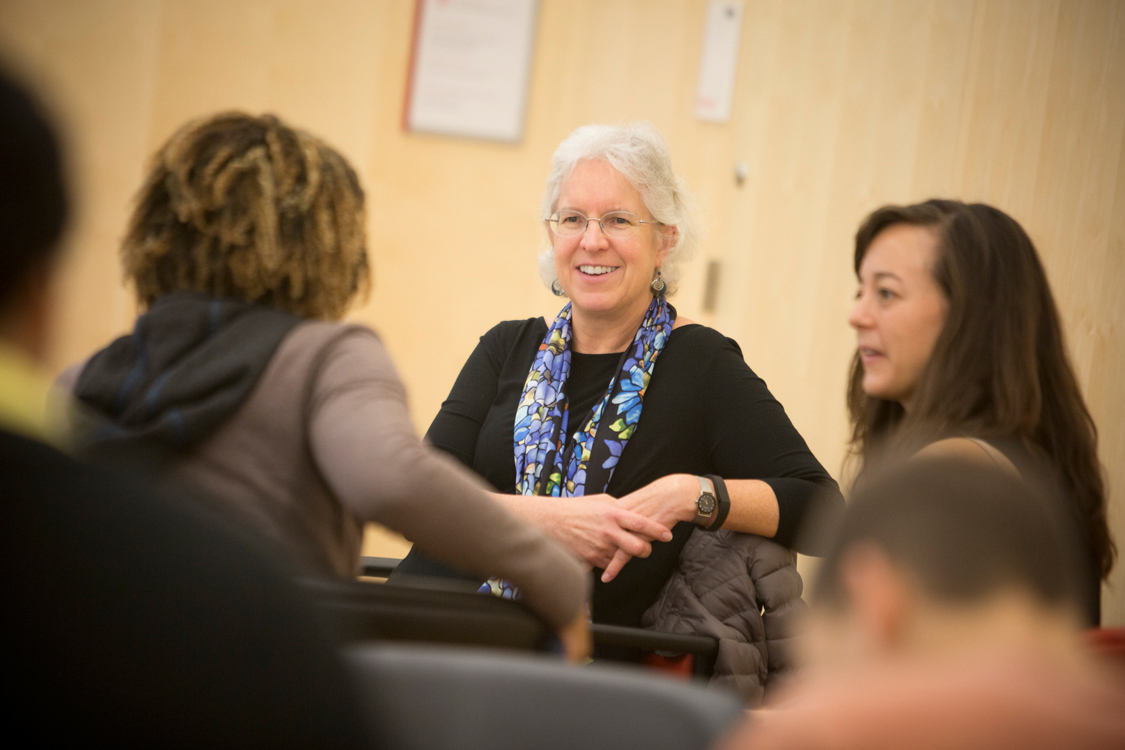Knuth on diversity: 'How do we build on our successes?'
By Natalie O’Toole

Cornell graduate and professional students organized a dinner Nov. 16 to discuss the campus climate called “Let’s Talk Diversity and Inclusion.”
Barbara Knuth, senior vice provost and dean of the Graduate School, delivered the keynote address, highlighting student data and survey findings on the graduate student experience.
Over the past decade, Knuth said, doctoral student completion has increased while time needed to complete a degree has shortened for students who identify as members of an underrepresented minority (URM) group. Today international, URM, and non-URM doctoral students have similar outcomes. Knuth observed that while URM students respond more positively to questions dealing with campus climate, there remains room for improvement.
In 2013, 32 percent of URM doctoral students rated their student life experience as “poor” or “fair;” in 2015 this number dropped to 19 percent. Also in 2013, 52 percent of URM doctoral students disagreed that Cornell faculty and staff are actively engaged in building a campus community that is concerned about issues regarding power and privilege, but by 2015 that number dropped to 33 percent.
“Perhaps we’re making some progress in that area. It would be helpful to know what factors might have contributed to those changes, and have those changes been sustained. … What is it that we can be doing to keep that momentum going?” Knuth asked.
She said URM students still respond more negatively than other groups to questions about Cornell’s climate. For example, 16 percent of URM students – but only 7 percent of non-URM students and 3 percent of international students – disagree that Cornell is committed to creating a positive environment for URMs. Similarly, 18 percent of URM students, 8 percent of non-URM students and 3 percent of international students disagree that Cornell’s administration has responded appropriately to acts of bias or violence targeting students.
“It suggests to us that we need to be doing better,” Knuth said. “One of the topics that we would like to hear from you… is what does it mean to you to actually have a positive environment at Cornell?”
After the survey data were presented, attendees participated in roundtable discussions about issues of concern and brainstormed solutions to make Cornell a more inclusive community, especially for graduate and professional students.
Ideas students presented included hiring more diverse faculty and administrators, increasing diversity and inclusion training for all faculty to help relieve the burdens on faculty of color, have an expanded central space for graduate students to interact, bringing students together through teambuilding activities with Cornell Outdoor Education, and department-level recruiting of students from backgrounds historically underrepresented in graduate education.
Yet students acknowledged these initiatives may not be easy to implement.
“Something that I consistently think about for trying to bring in more minority or marginalized students is, ‘How do you try and provide funding and incentives for them to come to Cornell for their graduate education without seeming like you’re meeting a number?’” said one doctoral student. “Am I getting [admitted] based on merit or because of my ethnicity, the color of my skin?”
Student feedback from the event will inform the ongoing work of the Graduate and Professional Students Association’s (GPSA) Diversity and International Students Committee, which works to improve graduate and professional students’ academic and social experiences.
The event was organized by the GPSA Diversity and International Students Committee with sponsorship from the Graduate School’s Office of Inclusion and Student Engagement, the International Students and Scholars Office, the International Students Union and the GPSA Programming Board.
Natalie O’Toole ’16 is a writer intern for the Cornell Chronicle.
Media Contact
Get Cornell news delivered right to your inbox.
Subscribe